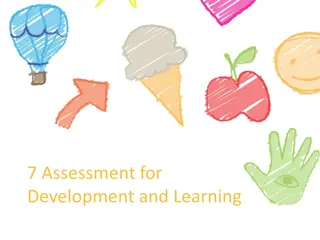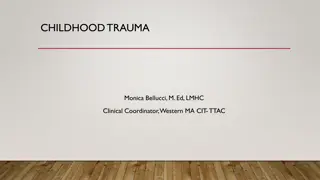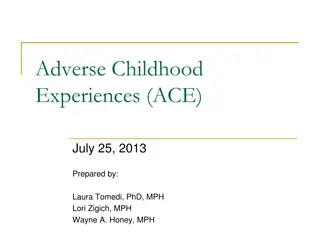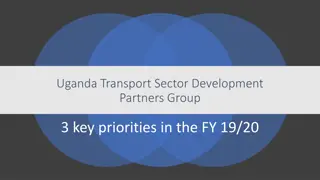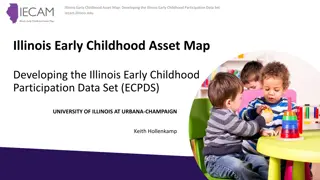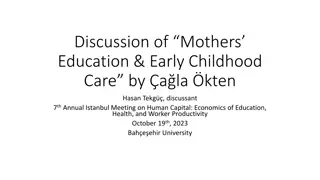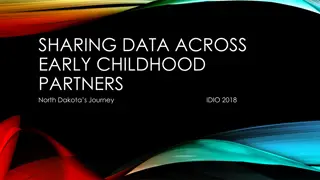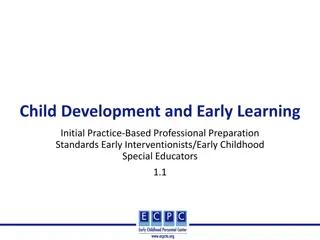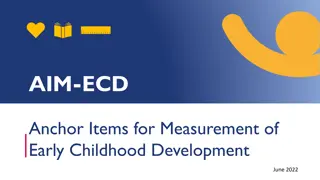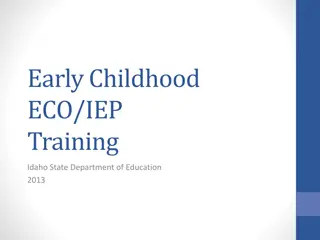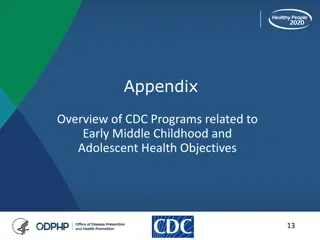Key Priorities and Progress in Early Childhood Development Implementation
Update on the key priorities for Early Childhood Development (ECD) implementation in 2024, focusing on mass registration, resource provisioning, scaling up access, parenting support, and improved coordination. The report discusses achievements over the last five years, challenges in access and quality, and outlines a vision for building a better South Africa for the future through ECD initiatives.
Download Presentation

Please find below an Image/Link to download the presentation.
The content on the website is provided AS IS for your information and personal use only. It may not be sold, licensed, or shared on other websites without obtaining consent from the author.If you encounter any issues during the download, it is possible that the publisher has removed the file from their server.
You are allowed to download the files provided on this website for personal or commercial use, subject to the condition that they are used lawfully. All files are the property of their respective owners.
The content on the website is provided AS IS for your information and personal use only. It may not be sold, licensed, or shared on other websites without obtaining consent from the author.
E N D
Presentation Transcript
EARLY CHILDHOOD DEVELOPMENT PORTFOLIO COMMITTEE ON BASIC EDUCATION 27 FEBRUARY 2024
Outline Building a South Africa for the future Context Key priorities for 2024: Mass Registration Resource provisioning Scaling up access Parenting support Improved coordination Issues raised in the previous Portfolio Committee meeting Conclusion Recommendation 2
Purpose To update the Portfolio Committee on the five key priorities for ECD implementation in 2024. 3
Context 4
Building a South Africa for the future Grade R/ pre-Grade R Pre-Grade R By 2034: they will read for meaning by 10 By 2029: they will Thrive by Five By 2042: they will receive a bachelors pass in Matric By 2045: they will be economically productive citizens Children born today 5
Context: The access and quality challenge Integrated services for all: Early nutrition, health, safety and social protection 80% 73% Early learning programmes Early stimulation 70% 64% Grade R/ pre-Grade R 60% 50% 42% Pre-Grade R 40% 31% 30% 19% 20% 10% 10% 0% 0 1 year 2 years 3 years 4 years 5 years Access: 1.3 million children aged 3 5 not yet attending any form of early learning. 6 Quality: Only 45% of children in early learning are developmentally on track (Thrive by Five) SOURCES: STATSSA GENERAL HOUSEHOLD SURVEY 2021; THRIVE BY FIVE 2021
Achievements over the last five years 2019 SONA: President announces intention for function shift 1 April 2022: DBE receives ECD function 1 April 2023: + 1 year 1 April 2024: + 2 years Preparation Stabilisation Planning Implementation Registration Payment of subsidy Monitoring Inter-sectoral & Inter-departmental collaboration Implementation of the 2030 Strategy: 1. Mass Registration Drive 2. Social Compact 3. Results-based financing 1. 2. 3. ECD Census Thrive by Five Public Expenditure & Institutional Review NMOG & PMOGs New Service Delivery Model 2030 Strategy for ECD 4. 7
Extract from SONA Over the next five years, we will focus our attention on expanding access to early childhood development and improving early grade reading, where we are already beginning to see progress. Moving early childhood development to the Department of Basic Education was one of the most important decisions as we were now able to devote more resources to early childhood development and ensure that through cooperative governance various departments of government get involved in early childhood development augmented by the Department of Basic education. Implications: Expanding access to ECD programmes Preparing for the first Inter-Ministerial Committee, convened by the President 8
What we are currently doing: Priorities for 2024 Implement a new mass registration drive and table the Children s Amendment Bill, to support over 20,000 early learning programme to be registered. Distribute health and safety packs, play and learning materials, and nutrition, to ensure key resources reach the most under-resourced early learning programmes. Scale up access to early learning programmes for 3 5-year-olds, targeting 170,000 children, by building new public private partnerships with social partners. Coordinate parent support interventions across departments, to ensure families with young children access support, and reaching 17,000 parents and caregivers in 2024. Put in place new mechanisms to drive progress against an agreed ECD Outcomes Framework to improve ECD leadership and co-ordination across departments and spheres of government. Government is implementing its 2030 Strategy for universal access and will target resources and effort so that vulnerable families and children in townships, informal housing and deep rural areas benefit most. A Social Compact for ECD will be launched to ensure strengthened coordination and integration
Mass ECD Registration Drive The Mass Registration Drive will target 20,000 unregistered ECD programmes and will provide them with conditional registration for 1 year. During this year, the DBE and municipalities will support ECD programmes to become compliant through the provision of pre-registration support packs, after which they will be required to apply for full registration. All ECD programmes will need to register according to legislation. This includes independent community based programmes; private programmes; NPOs and micro-enterprises Registration does not equate to funding. A certificate with the DBE s logo will be provided to ECD programmes to indicate that they have been conditionally/ fully registered. 11
A mass registration drive Re-prioritisation of resources across Education Districts Recommended Practice Notes for municipalities Simplified registration processes Roll-out of pre- registration support packs 2 4 1 3 12
Mass registration timeline January February March April May Communication with provinces 1 2 Pilot in Gauteng 3 Issuing Recommended Practice Notes Roll-out of pre-registration support packs 4 5 National Roll-out 13
Childrens Amendment Bill 2023 Short-term legislative reform for ECD is needed, which addresses the defects of the Children s Act in order that the DBE can make early progress towards its ECD goals and priorities. The DBE has comprehensively redrafted the Bill with input from the Technical Task Team. The new Bill is called the Children s Amendment Bill 2023 and will be out for public comment in February Registration integrated into single chapter. Clarification of the role of local government. NCF placed on a statutory footing. Responsibility for health and safety. Standard draft by-law for ECD. Different ECD modalities defined & regulation customised Regulations. Norms and standards headings revised and streamlined. Conditional registration clarified. 14
Provision of resources to ECD programmes Procuring minimum resource packs for the most vulnerable ECD programmes 1 Resources Pre-registration support packs: Prioritising the infrastructure component of the conditional grant to get unregistered ECD programme to conditional registration 2 15
Scaling up access: 2030 Strategy for Early Learning Universal access to quality ECD prioritising the most vulnerable children The definition of universal access is that every community has the right mix and availability of ECD programmes to meet the needs of the families and children in that community. 16
ECD Service Delivery Model: International experiences Study trips were undertaken to 5 different counties and the strengths of the different systems were used to shape a true South African ECD Service Delivery Model: Seychelles: Different programme modalities for child of different developmental and age stages Having a strong relationship between the ECD programme and the nearest primary school Maryland Entering into MOUs with large providers to support quality improvement in the ECD programmes Implementing a quality assurance system to communicate clear quality standards Finland & Denmark: High value placed on training ECD practitioners using a skills-based approach. Cuba Strong family support programme that is well integrated with the Department of Health 17 17
New ECD Service Delivery Model: Deliver ECD on the 6 Social Justice Principles: Access, Quality, Redress, Equity, Inclusivity and Efficiency (Appropriate legislative & policy will be developed) Planning- Population-based planning to target the most vulnerable communities to increase access. A DBE led planning and co- ordinated mixed provisioning model Co-ordination: Strong government leadership led by the DBE and improved co-ordination. Integrated provisioning: Universal access to a range of ECD programme modalities. 18
New ECD Service Delivery Model: Age appropriate modalities Parent support programmes (0-2 yr olds) Home visiting and outreach programmes to strengthen early stimulation in homes delivered in collaboration with the Department of Health Mixed provisioning model Early learning programmes (3-5 yr olds) 3 main modalities to provide early learning and language development opportunities: ECD centres, playgroups and day mothers 19
New ECD Service Delivery Model: Social Compact for ECD DBE: DBE: Legislation and policy for ECD Planning, coordination and directing access expansion Quality assurance and regulation Subsidising all eligible children Sister Departments: Sister Departments: Line function related mandates towards ECD Joint delivery of integrated programmes Implementing partners: Implementing partners: Expanding access Quality improvement and support Donors & business: Donors & business: Funding implementing partners for their support in expanding access and improving quality. 20
Parenting programmes Implement the National Parenting Programme by training 16,000 parents in the most vulnerable communities 1 Supporting Parents Partnered with Hope World Wide to support a further 2,200 parents in the most vulnerable communities with playful parenting practices. 2 21
Strengthened Integration Holistic ECD services are dependent on strong coordination and integration. The Inter-Ministerial Committee as proposed in the National Integrated ECD Policy (2015) New IMC focus on 6 Core Departments: Department of Basic Education Department of Health Department of Social Development COGTA National Treasury DPME 22
Roles and Responsibilities of DBE Department Mandate for ECD Universalise access to early stimulation and learning programmes Improve the quality of early childhood development and education programmes. Establish ECD specific legislative and regulatory framework Overall coordination of integrated Early Childhood Development programmes Key deliverables Basic Education 1. Implement a new Service Delivery Model and Strategy for ECD programmes 2. Implement the National Curriculum Framework (NCF) for children from Birth to Five. 3. Facilitate the training of ECD practitioners; Quality assure ECD programmes; 4. Plan, coordinate and direct expansion of access to Early Learning Stimulation and Programmes; 5. Track child developmental outcomes; 6. Early screening, identification, assessment and support for children with special needs. 23
Integration: Roles and Responsibilities of Core Departments Department Mandate for ECD Integrated programmes for joint delivery, such as: (What are we asking them?) Health Leverage health services to implement integrated ECD Delivery 1. Integrate early stimulation in Community Health Workers home visits. 2. Conduct health screening and immunisations at ECD programmes 3. Have medical professionals (therapists) support ECD programmes with vulnerable children and families with children with special-needs 4. Integrate early stimulation in the Side-by-Side Campaign (eg Early Literacy books along with Road to Health books) 5. Provide parenting programmes on early stimulation at health facilities. 24
Integration: Roles and Responsibilities of Core Departments Department Mandate for children 0 - 5 Integrated programmes for joint delivery (What are we asking them?) DSD Leverage social services to implement integrated ECD Delivery 1. Deliver child protection services at ECD programmes 2. Provide social support for vulnerable children and families with children with special-needs 3. Integrate early stimulation in their household level support (home visits) 4. Provide information and support on early stimulation through DSD service contact points. 5. Provide on-going support regarding social assistance. 25
Integration: Roles and Responsibilities of Core Departments Department Mandate for Childcare Facilities Integrated programmes for joint delivery (What are we asking them?) COGTA Leverage provinces and local municipalities to implement integrated ECD delivery 1. Clarify the roles and responsibilities as provided in Schedule 4B of the Constitution 2. Municipalities to take a council resolution to make ECD a priority 3. Supporting provinces and municipalities with the identification of appropriate facilities / available land in collaboration with the Department of Public Works (the custodians of State Properties) 4. Supporting provinces and municipalities with integrating ECD in their planning processes (IDPs) 26
Integration: Roles and Responsibilities of Core Departments Department Mandate for children 0 - 5 Integrated programmes for joint delivery (What are we asking them?) Progressively increase the value and reach of the ECD Subsidy in line with the ECD Financing Strategy for expanding access and improve quality. 1. Track progress on key outcomes and outputs. 2. Integrate programmes and outputs for ECD delivery into MTSF and Departmental APPs National Treasury Resourcing ECD service delivery DPME Ensure performance monitoring and evaluation for integrated ECD delivery 27
Mechanisms to strengthen the integrated delivery of ECD DPME to track progress and quality of outputs and outcomes against an agreed Outcomes Framework Include clear ECD deliverables in Department s APPs Convene the first Inter- Ministerial Meeting 1 2 3 28
Issues raised in the previous Portfolio Committee meeting 29
Budget and funding How was the funding allocated and monitored? What was the overall ECD budget? The overall ECD budget for the 2023/24 financial year was R3.912 billion, this entailed R205 million in the national budget vote, R1.184 billion in the Conditional Grant, and R2.523 billion through the Equitable Share. What strategies were in place to improve the availability of funding to eligible learners? substantial budgetary gaps appear. Access to the ECD subsidy will increase by R240 million in the 2024/25 and by R539 million in the 2025/2026 financial years. The DBE has developed a costing model for the expansion of access to the ECD subsidy, as well the required increase in the value of the ECD subsidy to enable the increase in quality of programme provisioning. How did the DBE engage with National Treasury to increase budgets for ECD, and what were the appropriate funds to transform the early learning landscape? A budget bid was submitted to National Treasury for the 2024/25 Medium Term Expenditure Framework to request an increase in the ECD budget in line with the costing model. However, being fully aware of the fiscal constraints facing South Africa, the DBE in collaboration with National Treasury, is busy preparing to implement a Results-Based Financing Initiative as an alternative funding mechanism. This mechanism will allow the DBE to implement its 2030 Strategy by co-funding increased access and improved quality of ECD programmes with donors and business. 30
Enrolment What strategies would be implemented to address the high number of learners not enrolled in ECDs? The DBE will be increasing access to ECD programmes through strategic public-private partnerships with implementing partners. Phase 1 of this model will be implemented through the Results- Based Financing Initiative. What factors informed the substantial number of 1.3 million children aged between three and five years who were not enrolled in ECD? There are both supply and demand side barriers that impact on enrolment. On the demand side, the two pertinent issues include the high fees that parents often need to pay as a result of the low value of the subsidy, as well as many parents not understanding the value of ECD. On the supply side there are not always ECD programmes available within walking distance for children aged 3 5 years old. 31
Accessibility How is accessibility of learners from marginalised backgrounds and learners with disabilities to quality ECD programmes? Access to ECD subsidy. 66% of the poorest children are not in ECD programmes and about 80% of 0-5s in poor rural areas do not attend ECD programmes. Only a third of ECD programmes are currently benefitting from the ECD subsidy. Did the Department have sufficient means to support about 4.7 million 0 to five-year- old learners that were not receiving the ECD subsidy? The ECD allocation is not sufficient to cover all children currently in ECD programmes and eligible for benefitting the ECD subsidy. A substantial increase in the ECD allocation is require to cover all children eligible to receive the subsidy, as we continuously expand access. What approach would be implemented to close the early learning gap for the 80 percent, particularly in rural areas? A population-based planning approach will underpin the expansion of access, priorities vulnerable children in deep rural areas, townships and informal settlements. How many ECDs accommodate learners with special needs? All ECD programmes are required to under-take an inclusive approach. Support for ECD practitioners are being developed to enable them to support inclusive practices in their programmes. 32
Parental Involvement How is the involvement of parents promoted? The DBE, in collaboration with UNICEF, is rolling out the National Parenting Programme. In 2024, we will be training 16,000 parents. Furthermore, in partnership with Hope World Wide, a further 2,200 parents will be trained on playful parenting practices. How media was used to promote early learning and for parents to contribute to early learning. The DBE is developing a public communication and awareness campaign to inform the knowledge, attitudes and practices of parents regarding learning through play and early stimulation. 33
Research and Best Practice How was research information used to inform policy and best practices? The DBE embarked on 4 key studies to inform the development of the new service delivery model and 2030 Strategy for ECD Programmes. These include (1) the 2021 ECD Census; (2) the 2021 Thrive by Five; (3) the Public Expenditure and Institutional Review; and (4) the Deep Dive into the implementation of the National Curriculum Framework. Yes, the DBE researched the ECD models of multiple countries to inform the development of our own unique ECD service delivery model. The countries considered include Finland, Denmark, Cuba, Seychelles and the United States. Finland also provided technical advise on the DBE s National Curriculum Framework for children from Birth to Four. Has comparative research on piloting the best practices of Lithuania and Finland been conducted? On "thrive-by-five" initiative - Was research in the pipeline, and would it be implemented? Yes, the next Thrive by Five Index will be conducted in August and September 2024. 34
Infrastructure What is being done about infrastructure challenges for ECD? The Department has developed an Infrastructure Strategy for ECD. What progress had been made by the Department with regards to challenges on infrastructure and scholar transport? In 2024, the DBE will focus on providing ECD programmes with health and safety registration packages to enable unregistered ECD programmes to meet minimum health and safety norms and standards. In parallel, the Department will start implementing the ECD Infrastructure Strategy. 35
Advocacy and Media Would the DBE partner with the DSD and social workers, such as providing information packages on social grants? Yes, this is one of the areas of collaboration that the DBE is exploring with DSD. The DBE will explore a similar collaboration with the Department of Health s Community Health Care Workers. How media was used to promote early learning and for parents to contribute to early learning. Answered above under parental involvement. General sense that there had been a lack of public consultation on Children s Amendment Bill The Bill has been approved by the Council of Education Ministers for public consultation and will be published for public comment by the end of February. 36
Capacity building What steps would be taken to promote human resources for early learning and to ensure enhanced capacity for practitioners? The DBE has established an inter-sectoral Human Development Task Team to develop a Human Resource Development Plan. The Plan will outline the professional pathway for ECD practitioners to ensure enhanced capacity. 37
Conclusion 38
Conclusion Equitable access Equitable access to early learning and development opportunities is the cornerstone cornerstone of improved educational outcomes educational outcomes and inclusive economic growth growth. improved inclusive economic To achieve this will require strong co collaboration and co collaboration and co- -ordination departments and spheres of government, but also with the ECD sector, social partners, business and donors and just as importantly, with families and communities. strong co- -operation, operation, ordination, not only across 39
Recommendation For the Portfolio Committee to note the key priority areas and plans for ECD implementation in 2024. 40







